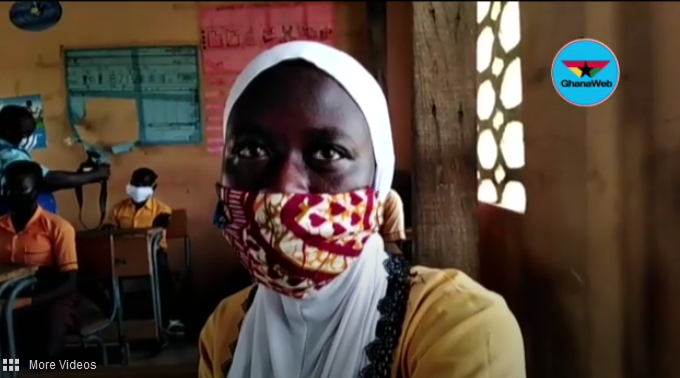Basic school pupils in the Binduri District of the Upper East Region have expressed dissatisfaction with the size and thickness of nose masks distributed to them by government.
Government as part of measures to curb the spread of the deadly Coronavirus, following the reopening of schools, provided Personal Protective Equipment (PPEs) including nose masks to ensure the safety of pupils against the widespread of the pandemic.
In the effort, PPEs such as nose masks and alcohol-based hand sanitizers were distributed to the pupils. Each pupil in the Binduri District received one nose mask and a bottle of hand sanitizer. Schools were also provided with ‘Veronica Buckets, Tissue paper, Liquid soap and classes were decongested to adhere to the social distancing protocol.
In the Binduri District, schools have resumed serious academic work, religiously adhering to the preventive protocols. When GhanaWeb visited some schools with the Ghana Centre for Democratic Development (CDD) in its “I am Aware Project” to sensitize pupils on Coronavirus and assess government’s response to help curb the spread in public institutions in the wake of the pandemic, it was observed that pupils put away the nose masks government distributed and made use of what they acquired themselves.
At the Binguri Junior High School (JHS) for instance, only one pupil in a class of 16 wore the government distributed noses masks to school. They rest put on self-acquired nose masks.
The pupils lamented that the nose masks government gave are larger than their faces, too thick and do not properly cover their mouths and noses thereby exposing them to the risk of infection. They explained that the straps are long, loose and the fabric thick and wide making it difficult to hold on to their faces.
The pupils further lamented the unavailability of waste bins in the schools to properly dispose off used tissue paper and other waste material. The inadequacy of hand sanitizers was also mentioned with explanation that what they received would soon get used up.
“The nose mask is too heavy and thick and also white and too big to wear and when we wear it, we cannot breathe”.
“When you put it on, you will be feeling hot and sweating. You will have to remove it every 5 or 10 minutes and while you are removing, others too want to remove so we will all be sitting without the nose masks which is dangerous. So that is why we are using our own nose masks which fit us well and not what they gave us”.
“Another challenge too is we don’t have dustbins where we drop the waste tissue paper inside when we finish cleaning our hands. We always drop it on the floor which is not good for us”, some of the pupils told Correspondent Senyalah Castro in an interview.
Check This Out: Kwahu Traditional Council orders shutdown of two pro-NDC stations
District Chief Executive (DCE) for the area, Yakubu Abagre Ayinga, when contacted on the issue blamed the mass production of the nose masks for the large sizes. He said because individual measurements of the pupils were not taken for the production, it was expected that the masks will not perfectly fit the faces of the pupils.
The DCE, however, assured to step in to address the issue. He stated that he would engage tailors to adjust the sizes of the nose masks to achieve accuracy to ensure pupils in the district are safe from the viral infection. He also assured to timely provide the schools with waste bins.
“Actually, I haven’t heard any incident after schools reopened for the final years but as time goes on issues come up and we will see how we can solve them. The information I am hearing about some of the nose masks being bigger than what the students need is expected because they are small children, if they don’t measure for the mass production of the masks it is difficult to determine some of these things. Sometimes it can be bigger, other times smaller or even mixed up. So, we (the assembly) are going to intervene to see what is happening and what we can do.
The assembly has engaged tailors through the local government to produce nose masks and so we will look at it from that angle and let the tailors also look at the students and see whether they can also reduce the sizes of the nose masks. On the issue of dustbin, I will speak to my director because we have some here at the assembly and I am sure what we have will be enough for the schools here”. The DCE assured.
The DCE said as a representative of government, he was committed to ensuring the safety of the pupils and fighting off the disease in the district. He urged parents and all in the district to join hands in the fight against the disease which has eaten so much into the world and caused deaths.
In a related development, the Executive Director of the Rural Initiatives for Self Empowerment Ghana (RISE Ghana), Awal Ahmed, has called on government to provide the opportunity and enabling ground for local producers of nose masks to curtail the supply challenge and issues with sizes.
Mr. Ahmed, who has observed some gaps in government’s efforts in providing PPEs to some public institutions especially in rural communities in the region such as schools, says when producers are helped to thrive, the fight against the pandemic will be made easier for vulnerable groups in society.
Mr. Ahmed noted this when he joined the “I Am Aware” citizen group in Binduri Wednesday to monitor public institutions such as schools to assess the response of government in helping them fight the coronavirus.
He said: “when the citizen groups were monitoring, they realized that inasmuch as government has done well in terms of responding and providing the necessary protocols and accoutrements for pupils to adhere to the covid-19 protocols, there were some gaps. For instance, some of the nose masks are produced and introduced to the districts from different locations so you find some of them very big for our children and you find that some of the schools do not have the full complement. Even though the process is still ongoing, I think that going forward, the government needs to pay attention to and provide opportunities for local producers to be able to produce this material so that we can get sizes fit for the children”.
Source: www.ghanaweb.com






















